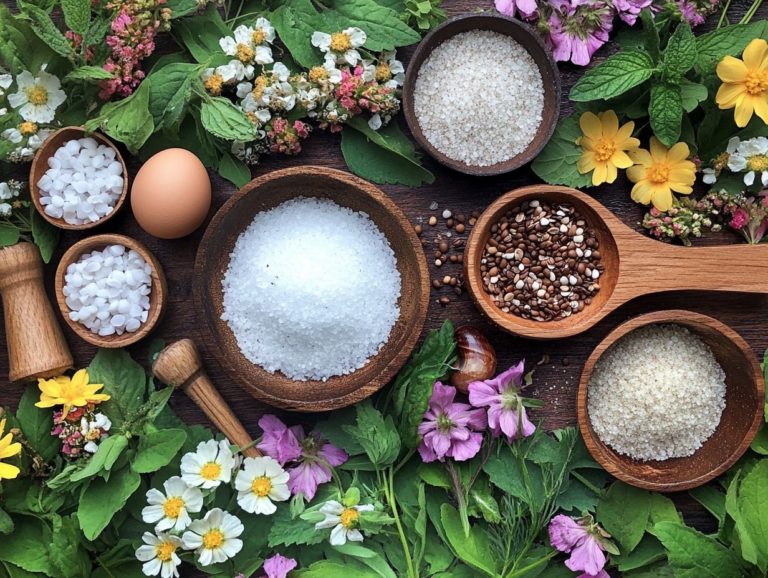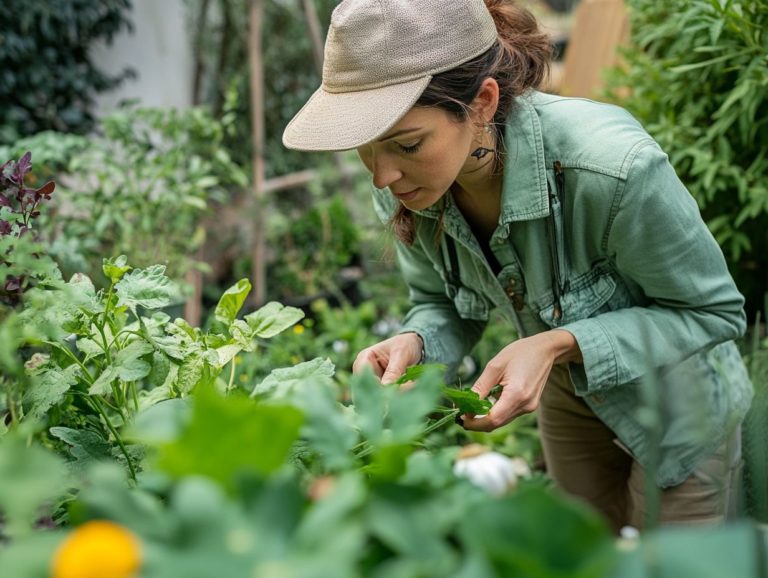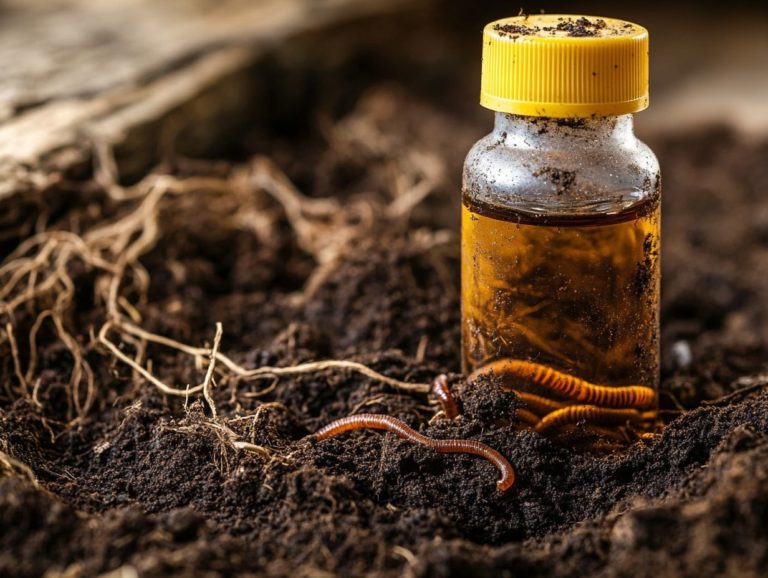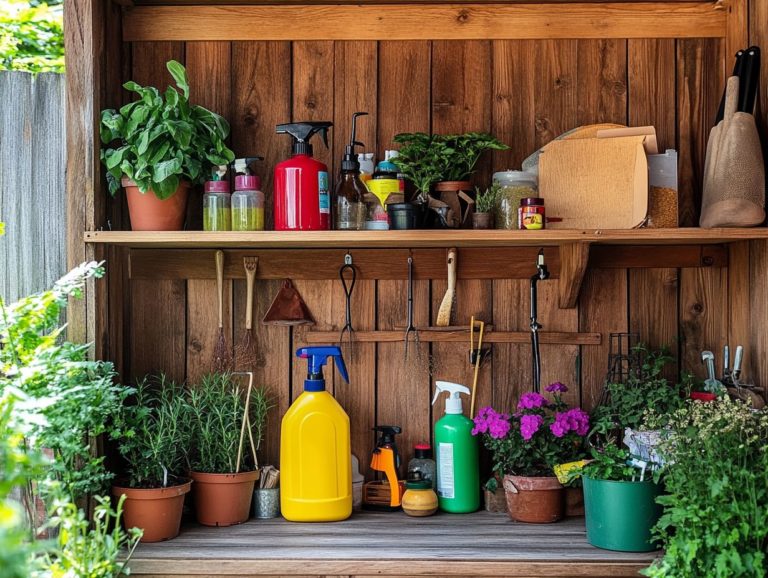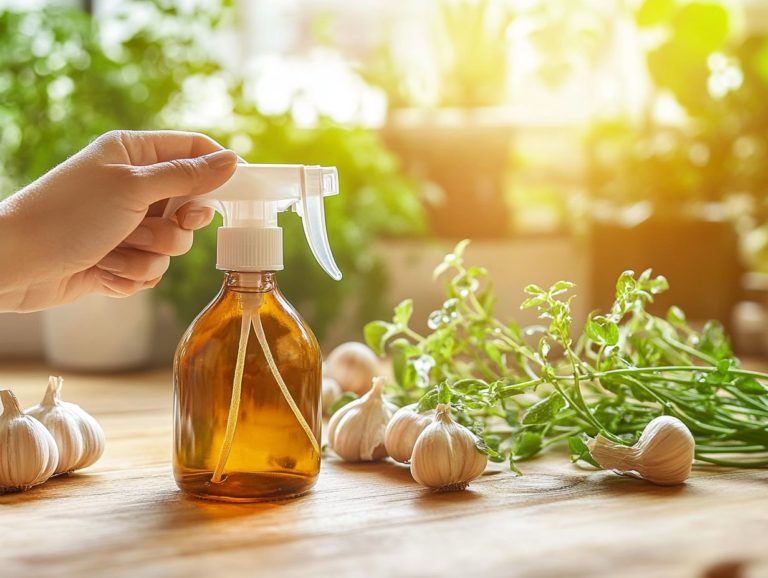How to Use Companion Flowers to Deter Pests
Companion flowers provide a harmonious approach to gardening through companion planting, elevating both the health and aesthetics of your plants.
By thoughtfully pairing flowers with your vegetables and aromatic herbs, you can start cultivating a natural ecosystem that not only deters pests but also fosters robust growth.
Unlock the amazing benefits of companion flowers today, such as effective pest control, pest-repellent flowers, and enhanced vitality for your plants.
Learn how to select the right companions, identify specific flowers that serve as pest deterrents, and gather essential gardening tips for nurturing a thriving garden.
Immerse yourself in this transformative gardening experience, where organic gardening practices take center stage!
Contents
- Key Takeaways:
- Benefits of Using Companion Flowers
- Choosing the Right Companion Flowers
- Companion Flowers for Common Pests
- How to Use Companion Flowers in Your Garden
- Maintaining Your Companion Flower Garden
- Frequently Asked Questions
- What are companion flowers and how can they help deter pests?
- Which flowers are best for deterring specific pests?
- How should I plant companion flowers in my garden?
- Do companion flowers have any other benefits besides pest control?
- Can companion flowers be used in place of pesticides?
- Are there any precautions I should take when using companion flowers?
Key Takeaways:

- Use companion flowers to naturally control pests in your garden and improve plant growth while enhancing garden health.
- Consider factors like pest type, plant compatibility, and bloom time when choosing companion flowers to optimize pest management.
- Plant companion flowers strategically and maintain them properly for effective pest deterrents and a thriving garden.
What are Companion Flowers?
Companion flowers are the unsung heroes of organic gardening. They are specific plants that naturally promote growth, deter garden pests, and invite beneficial insects into your garden.
By incorporating these flowers, you can cultivate a variety of plants that enhance insect diversity, ultimately contributing to a healthier and more resilient garden ecosystem.
With the right combinations, you can maximize the benefits of companion planting, leading to effective pest management practices and improved plant health.
The beauty of this concept lies in the idea that a diverse array of plants can confuse pests and disrupt their life cycles. This makes it more challenging for pest populations to thrive.
For instance, marigolds are renowned for their ability to repel nematodes and act as aphid repellents while simultaneously attracting pollinators, creating a harmonious balance within the ecosystem.
Planting flowers alongside your vegetables not only enhances nutrient uptake but also elevates flavor, demonstrating the significance of beneficial plant combinations.
By integrating companion flowers into your gardening practices, you strengthen your pest control efforts and nurture a flourishing environment that supports a variety of beneficial organisms.
This paves the way for a more sustainable approach to organic gardening.
Benefits of Using Companion Flowers
The advantages of incorporating companion flowers into your garden extend far beyond mere visual appeal; they are essential in fostering overall garden health and aiding in effective natural pest control through organic methods.
By thoughtfully integrating a variety of plant species, you can cultivate an environment that attracts beneficial insects while reducing pest populations.
This promotes organic gardening practices and effective gardening.
Natural Pest Control
Natural pest control through companion flowers is an effective way to minimize harmful garden pests while using companion gardening to control aphids and fostering a thriving ecosystem that supports insect habitats.
By incorporating insect-repellent flowers and aromatic herbs, you can create inviting habitats that attract beneficial insects.
This allows you to manage pest populations organically without relying on chemical methods.
Take marigolds, for example. They re renowned for their ability to deter nematodes and common pests like aphids and whiteflies. This makes them a must-have in many home gardens as effective pest control flowers.
Nasturtiums, on the other hand, serve a dual purpose; they act as herb repellents, repel unwanted insects while drawing aphids away from your prized vegetables. This protects your delicate plants in the process.
By weaving these vibrant flowers into your garden designs, you nurture a more balanced environment where pollinators flourish.
This ultimately enhances biodiversity and supports insect diversity. Such organic pest management practices align perfectly with your eco-conscious values, offering sustainable solutions while ensuring your garden remains vibrant and productive through the use of organic pesticides.
Improved Plant Growth
Companion flowers can elevate growth in neighboring plants. They foster a vibrant vegetable garden and promote optimal garden health.
By thoughtfully selecting beneficial plant combinations, you enhance nutrient uptake. This also bolsters resilience against pests and diseases.
Planting marigolds alongside tomatoes is effective. This not only deters nematodes, a type of tiny worm that can harm plants, but also attracts beneficial pollinators.
Introducing nasturtiums provides essential shade for tender seedlings. This reduces exposure to harsh sunlight and prevents sunburn while enhancing plant variety.
When you pair oxeye daisies with brassicas like cabbage, you increase variety of plants. This cultivates an environment that invites predatory insects, supporting effective pest management practices.
Such intentional associations showcase how companion flowers can significantly boost overall plant vitality. They contribute to organic gardening success, ensuring your garden flourishes beautifully.
Choosing the Right Companion Flowers
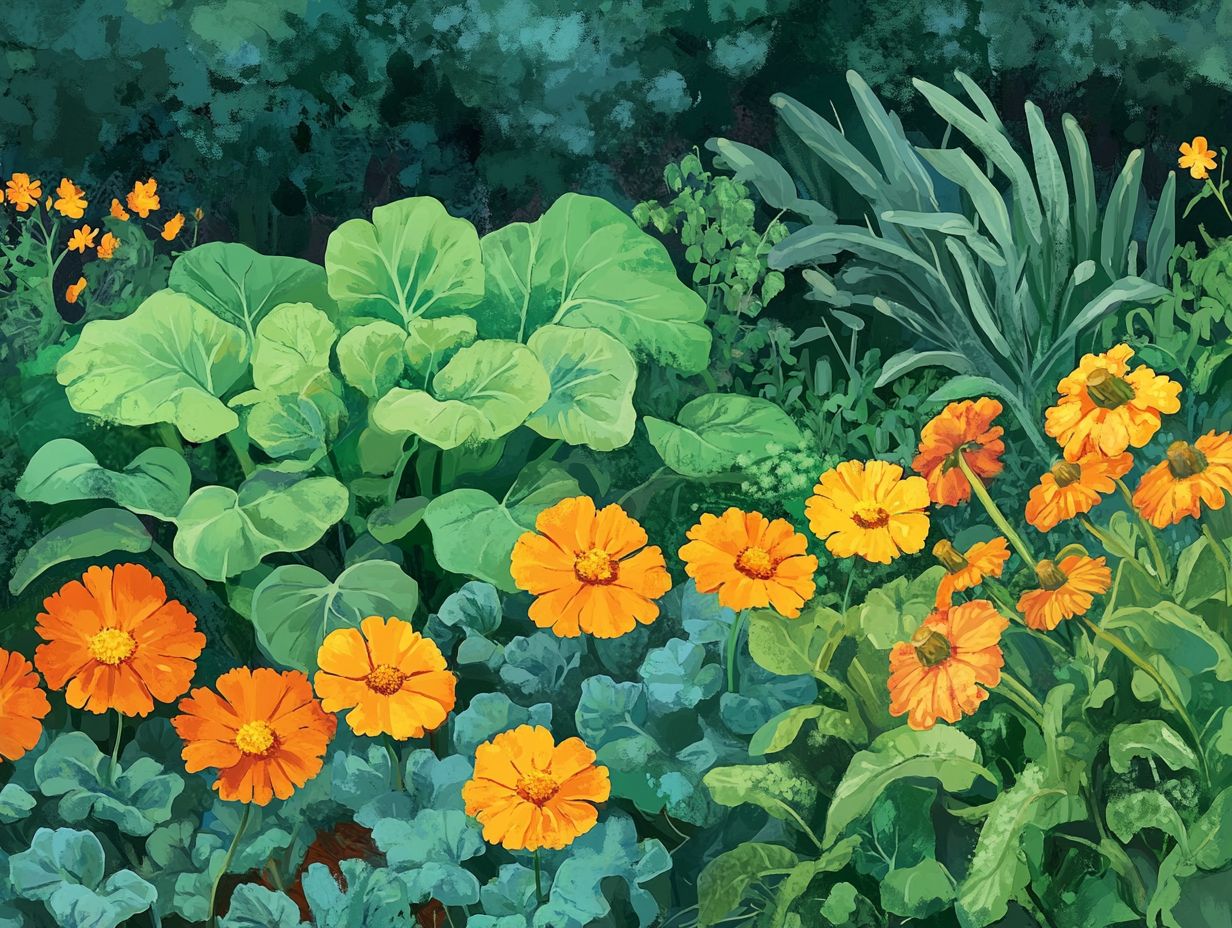
Selecting the right companion flowers is essential for garden planning. They can greatly impact pest control and improve overall plant health.
Understanding the unique functions of various flowers helps you make informed choices. This elevates your gardening experience and optimizes pest management.
Factors to Consider
Consider several key factors when choosing companion flowers. This ensures effective pest management and optimal growth.
Climate suitability is crucial; some flowers thrive in specific temperature and humidity conditions. This makes them ideal for your pest control strategies.
Assess soil conditions for compatibility. While some flowers prefer well-drained sandy soils, others thrive in rich, loamy earth, optimizing garden health.
Don t overlook the watering needs of both the flowers and their companions. Inconsistent moisture levels can lead to wilting or root rot, impacting overall garden maintenance.
Including herbs alongside your flowers boosts visual appeal. They also serve as natural pest deterrents, enhancing the benefits of organic gardening practices.
This approach enhances variety of plants and promotes soil health. It also helps manage pest populations, creating a thriving ecosystem in your backyard.
Companion Flowers for Common Pests
Some companion flowers are excellent at deterring pests. Incorporating these into your garden can enhance organic pest control methods, and learning how to use companion herbs for pest control can provide even more benefits.
By adding these flowers, you can improve pest control efforts while promoting the overall health of your plants.
Specific Flowers to Deter Pests
Flowers like marigolds and nasturtiums are your allies against pests. They protect your plants and attract beneficial insects that improve your garden’s health.
Consider adding calendula and zinnias to your garden. Calendula repels nematodes, while zinnias attract ladybugs and lacewings that eat aphids.
By planting these colorful flowers in your vegetable garden, you create a friendly environment. This setup keeps harmful pests away and helps your herbs like basil and cilantro thrive.
This approach boosts your garden’s productivity. It also encourages a rich mix of plants that supports effective pest management.
How to Use Companion Flowers in Your Garden
To use companion flowers effectively, plan your garden strategically by selecting plants that enhance your existing flowers and improve pest control naturally. For more detailed strategies, check out how to use companion planting for pest control.
Understand the benefits of different flowers and herbs. This knowledge helps you create a thriving organic garden that promotes growth and biodiversity.
Planting Strategies and Tips
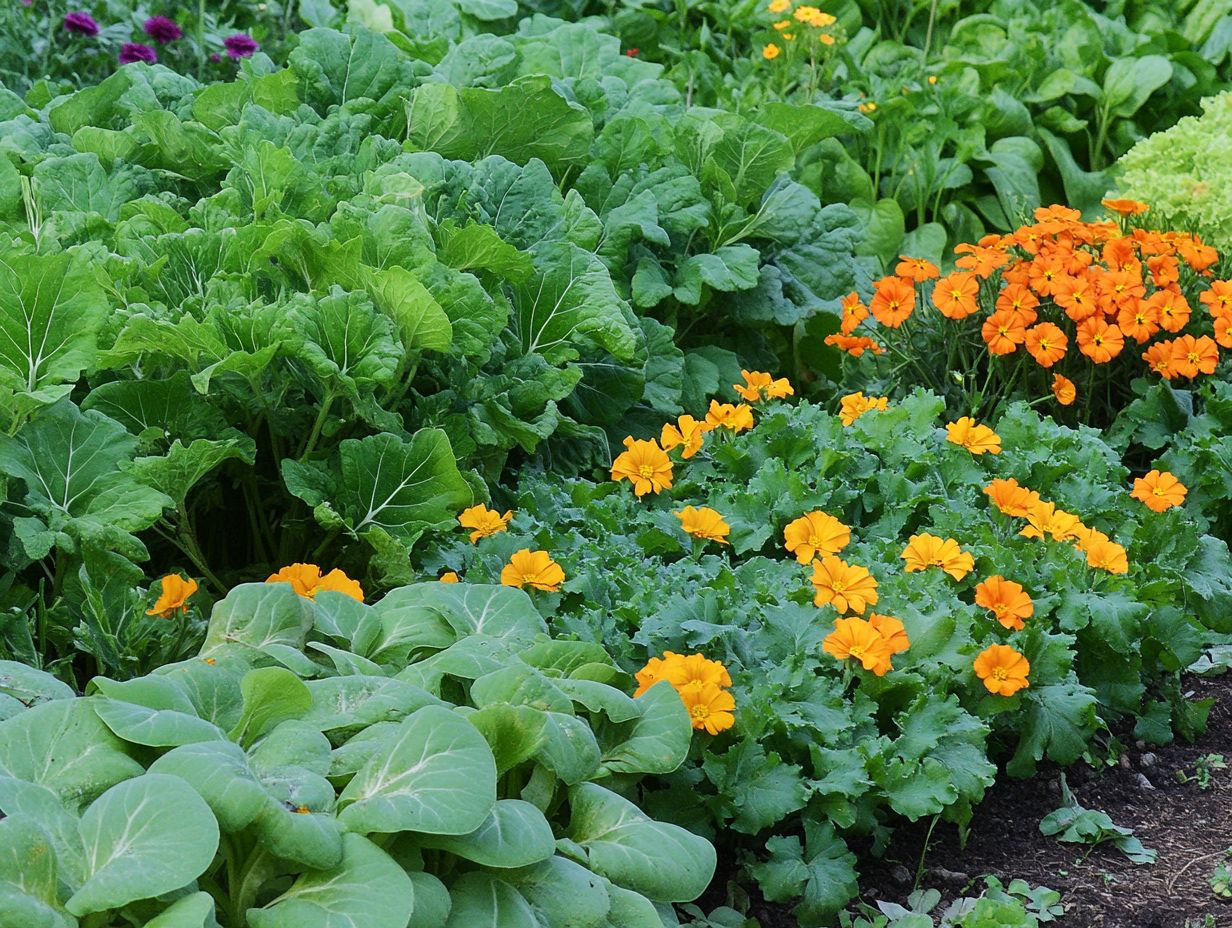
Effective planting strategies enhance the benefits of companion flowers. This not only boosts your pest control efforts but also leads to healthier plants.
Timing is crucial. Plant companion flowers just before your main crops to maximize their protective qualities. Crop rotation is important too; changing planting locations each season helps keep soil healthy and pest populations low.
If you prefer organic methods, try diverse planting layouts. This attracts beneficial insects and creates a resilient ecosystem. Techniques like planting flowers and vegetables together (interplanting) and adding mulch can enhance nutrient availability and soil moisture. This ensures both flowers and vegetables thrive together.
Maintaining Your Companion Flower Garden
Keeping a companion flower garden requires attention and care. This ensures both flowers and vegetables thrive while managing pests effectively.
By practicing regular maintenance, you can keep your garden healthy and vibrant. Your dedication will not only support a thriving ecosystem but also enhance your gardening experience.
Proper Care and Maintenance Techniques
Proper care for your companion flowers is vital. This helps maximize their pest control abilities and boosts garden health.
Establish a consistent watering schedule to keep soil moisture levels optimal. This is crucial for the health of both your companion flowers and vegetables.
Regularly use organic fertilizers to feed your plants. This will help them grow strong and fend off pests effectively.
Keep an eye on your plants for pest signs. Inviting beneficial insects, like ladybugs, can help protect your garden.
These strategies promote healthy plant growth and support a balanced ecosystem that naturally reduces pests.
Frequently Asked Questions
What are companion flowers and how can they help deter pests?
Companion flowers are planted alongside vegetables or herbs to attract helpful insects and repel harmful ones. They release natural scents that keep pests away or attract insects that eat them, highlighting the benefits of using companion plants.
Which flowers are best for deterring specific pests?

Marigolds repel nematodes. Nasturtiums keep aphids and beetles away.
Petunias fend off tomato hornworms, while chrysanthemums deter ants, roaches, and Japanese beetles.
How should I plant companion flowers in my garden?
Intermingle companion flowers throughout your garden. This creates a diverse ecosystem that attracts beneficial insects and deters pests from various areas.
Do companion flowers have any other benefits besides pest control?
Yes! They attract pollinators like bees and butterflies, which are vital for many plants. They also enhance soil quality and beautify your garden.
Can companion flowers be used in place of pesticides?
While companion flowers help with pest control, don’t rely on them alone. Consider incorporating the best companion plants for pest control alongside other natural methods, like handpicking pests and using barriers, for the best results.
Are there any precautions I should take when using companion flowers?
Research the specific companion flowers to ensure they are safe for your plants. Avoid using chemical pesticides nearby, as they can harm the beneficial insects.

